Birdies Who Pluck
If you just want suggestions on what to do for your plucker, go here.
If your bird is plucking its feathers, the first thing to try is a medicine called Ronivet-S. You can get this medicine on the Internet without a prescription at various places. Vetafarm is a company which will ship internationally. Ronivet-S is easy to use and has a better success rate for stopping plucking than anything else I know of. (NOTE: I don't make any money from Ronivet-S. I endorse it because of its excellent results.) If you own more than one bird, treat them all with Ronivet-S at the same time, even the non-pluckers. The non-pluckers may have the same illness, although they aren't showing the symptom of plucking. You don't want any of your untreated birds to re-infect your plucker after treatment. It may take up to two months for your plucker's feathers to grow back after he stops plucking, so you might need this long to see the good results.
Plucking is when a bird chews on, or tears out, its own feathers or someone else's feathers. Plucking can be as mild as a small patch of chewed feathers, or as bad as a totally naked bird (except the head, which the bird can't reach). When the plucking includes damage to the skin, we call it self-mutilation.
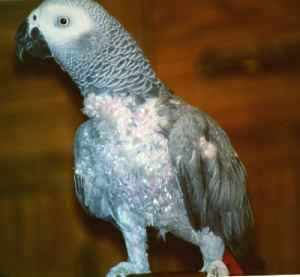 Lots of different things can cause a bird to pluck. The causes can be medical things, like dry itchy skin due to some skin condition. The causes can be emotional, like if the owner buys a cat which threatens the bird. There is a new theory that plucking sometimes is caused by an infection that attacks areas of the brain. Ronivet-S is a medication that combats parasites, and so perhaps many cases of plucking are due to parasites.
Lots of different things can cause a bird to pluck. The causes can be medical things, like dry itchy skin due to some skin condition. The causes can be emotional, like if the owner buys a cat which threatens the bird. There is a new theory that plucking sometimes is caused by an infection that attacks areas of the brain. Ronivet-S is a medication that combats parasites, and so perhaps many cases of plucking are due to parasites.
It was once thought that plucking was due to sexual frustration, and that a bird who plucked should be allowed to breed. This is not true. Breeding is a stressful activity and is more likely to make the situation worse, regardless of the initial cause. (Some birds pluck ONLY when they are in a breeding situation.)
Plucking is not an easy behavior to correct. It's not even an easy behavior to understand. It is akin to the human obsessive-compulsive disorder. In an obsessive-compulsive disorder, people feel strongly and unreasonably compelled to do some type of activity, such as repeated hand-washing, repeatedly checking to see if the stove is off, pulling out their hair, etc.
If you have never observed this type of behavior in people, think of plucking as an addictive behavior, or a very hard habit to break, like smoking. People might know that an obsessive-compulsive behavior (or an addiction, or a bad habit) is harmful, but this knowledge does not make it easy for the person to stop. More than just will power may be required for a person to stop a compulsive or addictive or habitual behavior. And so it is with plucking birds.
One thing is certain: plucking almost NEVER goes away by itself. You must do something to help your bird stop plucking.
You should also remember this: even if you do everything right, your bird may still pluck. The stressor or disease that started the plucking may go away and the plucking may continue. You do what you can, and if you have tried everything you can think of and the bird still plucks, don't feel you've been a bad bird parent! Also remember that it may take a lot of time to get the behavior completely stopped and that relapses happen.
It is important to start intervening as soon as possible; the longer a bird plucks, the harder it will be to get the bird to stop. So, with all that in mind, what should one do?
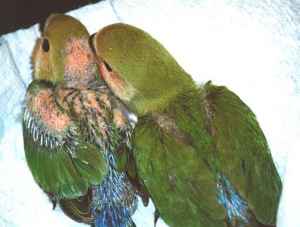
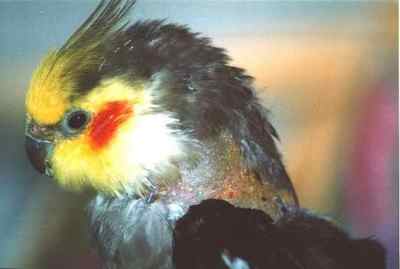 It is important to rule out medical causes first, and remove obvious stessors. This means that you need to get your plucker to a vet who is knowledgable about birds (not all of them are) to see if there is any medical cause for the plucking. Medical conditions both internal and external can cause a bird to pluck. These range from mites to giardia to beak & feather disease. If there is a medical cause, treatment MIGHT be as simple as treating the disease. Also, do try a course of Ronivet-S, since it really seems to stop many pluckers very quickly.
It is important to rule out medical causes first, and remove obvious stessors. This means that you need to get your plucker to a vet who is knowledgable about birds (not all of them are) to see if there is any medical cause for the plucking. Medical conditions both internal and external can cause a bird to pluck. These range from mites to giardia to beak & feather disease. If there is a medical cause, treatment MIGHT be as simple as treating the disease. Also, do try a course of Ronivet-S, since it really seems to stop many pluckers very quickly.
In cases where the bird has had an obvious stressor and then starts to pluck, take steps to remove the stressor. For example, I know a female lovebird who had been a fine mother in the past. But when she and her mate had their most recent clutch, there were two male birds who hung around the nest box, bothering the pair. The mother began to pluck the babies. The owner removed the two pesky males, and the plucking stopped. We can presume that the stress of having the bothersome males around was enough to make the mother pluck her babies.
Sometimes the stressor is not something you can change. The cockatiel on the right suffers from subcutaneous emphysema, a congenital condition where his air sacs (located on his neck) do not empty properly when he is excited. The air sacs puff up and stretch the skin tight, day after day, on this poor bird. The tight, stretched skin does not feel good, so the bird plucks the feathers over the air sacs. He occasionally mutilates the skin in that area, and plucks other areas on his body as well.
Sometimes the stressor is something emotional. An African Grey parrot was owned by a couple who got divorced. The bird plucked out almost every feather she could reach. When she was placed in a new home, her feather plucking subsided.
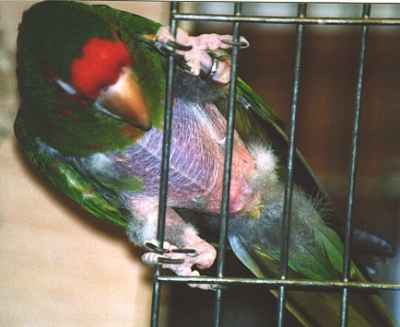
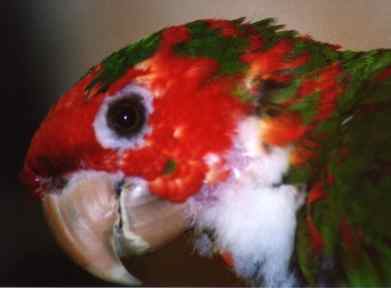 Sometimes the bird has been plucking for so long that you can do nothing to help. This female conure (shown at left) probably began plucking because she was lonely, long before I acquired her. She now has a mate and seems quite happy, but still plucks. In fact, she even plucks her mate.
Sometimes the bird has been plucking for so long that you can do nothing to help. This female conure (shown at left) probably began plucking because she was lonely, long before I acquired her. She now has a mate and seems quite happy, but still plucks. In fact, she even plucks her mate.
Her mate, shown at the right, was in perfect feather till he met the love of his life. See the area with the white, downy feathers? The white down is supposed to be covered up by green feathers. The green feathers have all been chewed off by his mate. How do we know it was his mate who plucked him and not he himself? Because his beak could not reach the area that has been plucked; the culprit has to be his mate.
Sometimes (not always), if a bird has been plucking for a long time, there may be nothing you can do to help. You may have adopted a bird who has been plucking for years. The original stressor or disease that started the plucking might be long gone. Do try to help your plucker, even if the plucking has been going on for a long time. Your bird will live longer and be healthier if you can help it to pluck less.
You can tell whether a bird is plucking itself or being plucked by its mate, by the area that is plucked. A bird cannot reach the top of its head, or its face. Any plucking in those locations is due to the partner. Babies in the nest are usually plucked by the mother. Plucking that is from the neck down is usually self-inflicted.
The most frequent non-medical causes of plucking are loneliness and boredom.
Summary: How To Help Your Plucker:
- Try a course of treatment with Ronivet-S. This is a powder that you mix with water and use it as your bird's only water source for seven days. If you have more than one bird, treat them all! The rest of the birds may have the same illness as the plucker, although they aren't manifesting it by plucking. Plus, you don't want the seemingly healthy birds to re-infect your plucker. Remember, the bird's feathers may take two months to grow back, so you might have to wait that long for results. If your bird mutilates its skin, you may see results in as little as two weeks, as the skin heals.
- Get your bird to a vet to rule out other medical causes.
- Next, remove any stressors that came about before or at the time the bird began to pluck. Dogs and cats and unsupervised children can be stressors; being in a cage that is low to the ground can be a stressor, being too isolated is a stressor, etc.
- Give the bird a bath every day. It will have to spend some time preening the feathers afterward, which gives it something useful to do with them.
- Be sure you are feeding the bird a well balanced diet. Poor nutrition is a stressor that can cause plucking. Almost every bird will benefit from the addition of fresh foods in addition to its seed or pellets. Female birds need a mineral block or cuttle bone or clean eggshell or some other form of calcium. Your bird will live longer and be healthier if you feed it a wider variety of foods. Bird seed alone is not an adequate diet. Feeding your bird nothing but bird seed is like feeding your kid nothing but pizza. Sure, it's nutritious, but eventually the kid or bird is going to die of organ failure from the horrible diet. Birds need fruits, vegetables, greens, cereals, grains, and other good fresh stuff. (No meat or dairy, except some cooked egg -leave the shells in.) Be sure to remove fresh food before it spoils. Put a bit of fresh stuff on top of the seed every day. Don't completely cover the top of the seed; you want the bird to know there is seed underneath the fresh stuff. But they will have to at least nudge the fresh stuff aside to get to the seed. Do this EVERY day. It doesn't matter if they don't eat it; just because your kid doesn't want anything but candy doesn't mean you stop putting good stuff on his plate. My most stubborn seed addict ate no fresh food for nine months. But every day for nine months I put the fresh stuff on her seed and every day she'd toss it aside, till one day she took a nibble. They always do. The following foods are toxic to birds: Alcohol, Apple seeds, Avocado, Caffeine, and Chocolate. Never feed these foods to your birds. Some favorite healthy "people foods" are: broccoli, apples, corn, pasta, greens, bread, cheerios, cooked rice (white or brown), popcorn, corn bread, yams, celery.
- Give your bird more things to do. Birds are intelligent creatures who need to keep busy. When you are not at home, put the tv on for the bird (mine like the kid's shows on public television; those shows are aimed at intelligent beings with short attention spans, just like birds!).
- Give your bird new toys and more toys. Busy beaks are happy beaks. If your bird destroys a toy, consider getting it another of the same toy, so it can destroy it again. That toy was obviously a success! The bird was not plucking while its beak was busy with a toy.
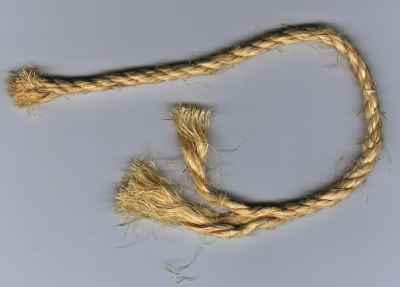 Buy sisal rope at a hardware store and tie lengths of it to the bird's cage. Position it so that the rope dangles down at beak level near the bird's favorite perch. Sisal is a natural, tough fiber that the bird can gnaw on all day. If the rope gets too frayed, replace it. It's a cheap and useful toy.
Buy sisal rope at a hardware store and tie lengths of it to the bird's cage. Position it so that the rope dangles down at beak level near the bird's favorite perch. Sisal is a natural, tough fiber that the bird can gnaw on all day. If the rope gets too frayed, replace it. It's a cheap and useful toy.- Buy a cheap feather duster. Do not get one that has been treated with some chemical to make the feathers pick up extra dirt. Wash the feather duster well if you have any doubts. Hang the feather duster in the bird's cage near its favorite perch so that the feathers are at beak level. If you can't fit the feather duster inside the cage, hang it on the outside and let the feathers poke enticingly through the bars. If your bird is going to chew feathers, let it chew someone else's feathers.
- Along the same lines, some companies sell bird toys made with feathers. Get one of these if you don't have a feather duster in the cage.
- Whenever you see your plucker engaged in some healthy activity such as playing with toys or bathing, praise him/her. Let the bird know you approve heartily of such activities. Do not try to punish the plucking behavior; you may damage your relationship with the bird and make the plucking worse.
- There is a spray called "Bitter Apple" sold in some pet supply stores. You spray the stuff on your bird's feathers and it makes them taste bitter. The spray does not harm your bird. It works in some cases to deter the bird from plucking.
- If your bird is alone all day, it may need a companion bird. The companion bird can be of either sex. If the birds do not know each other, you will have to start them off in separate cages side by side until they get to know each other.
- Antidepressant medicine is often successful in helping humans combat obsessive-compulsive behavior. It is also helpful in some cases to combat plucking and self-mutilation in birds. If your bird is damaging its skin, the plucking is severe enough to be a health risk. Consult your vet about antidepressants for your bird. You may not wish your bird to be on psychotropic medication, but if your bird needs medicine, get it medicine!
- There is something called an "Elizabethan Collar" which physically prevents the bird from getting to its feathers. Your bird will be unhappy if you put one of these things on it. The collar itself is stressful to the bird. However, if your bird is mutilating its skin, the plucking is a health risk. A collar may be necessary if the bird is mutilating. I would try everything else before a collar, though.
- If your efforts don't stop the plucking but do make it less, consider that a success! A bird who goes from self-mutilation to mere plucking is a success story. A bird who goes from being naked to being scruffy-feathered is a success story. Love your bird and don't feel guilty if you can't stop the plucking completely.
- When something works, even a little bit, KEEP DOING IT! Persist! You can't just change things one time and expect plucking to go away forever. Ask any recovering alcoholic if addictions go away: they don't. Your bird is a recovering plucker; it needs you to continue to help it for the rest of its life. Don't stop the medication, don't stop changing out the toys, don't stop feeding your bird a varied diet, don't stop giving it baths, don't stop leaving the tv on, and replace that feather duster every time it gets destroyed.
- If your bird is helped by a medication such as Ronivet-S, and then later the plucking starts up again, it might mean the bird has picked up a new infection and needs another course of treatment. There is a parasite called giardia, for example, which affects both birds and humans. Some communities consider a certain number of giardia parasites in the drinking water to be "acceptable". The "acceptable" level is too low to affect humans but can kill a bird. So your bird might become reinfected periodically.
- Whenever you find something that helps your bird, do all birds everywhere a favor and notify your vet of your success or partial success. Plucking is not well understood. The more data we can give our vets as to what cures or reduces plucking, the better they can treat the next plucker they see.
BACK TO NAN & FLOCK'S HOME PAGE
This page hosted by  Get your own Free Home Page
Get your own Free Home Page
 Lots of different things can cause a bird to pluck. The causes can be medical things, like dry itchy skin due to some skin condition. The causes can be emotional, like if the owner buys a cat which threatens the bird. There is a new theory that plucking sometimes is caused by an infection that attacks areas of the brain. Ronivet-S is a medication that combats parasites, and so perhaps many cases of plucking are due to parasites.
Lots of different things can cause a bird to pluck. The causes can be medical things, like dry itchy skin due to some skin condition. The causes can be emotional, like if the owner buys a cat which threatens the bird. There is a new theory that plucking sometimes is caused by an infection that attacks areas of the brain. Ronivet-S is a medication that combats parasites, and so perhaps many cases of plucking are due to parasites. 
 It is important to rule out medical causes first, and remove obvious stessors. This means that you need to get your plucker to a vet who is knowledgable about birds (not all of them are) to see if there is any medical cause for the plucking. Medical conditions both internal and external can cause a bird to pluck. These range from mites to giardia to beak & feather disease. If there is a medical cause, treatment MIGHT be as simple as treating the disease. Also, do try a course of Ronivet-S, since it really seems to stop many pluckers very quickly.
It is important to rule out medical causes first, and remove obvious stessors. This means that you need to get your plucker to a vet who is knowledgable about birds (not all of them are) to see if there is any medical cause for the plucking. Medical conditions both internal and external can cause a bird to pluck. These range from mites to giardia to beak & feather disease. If there is a medical cause, treatment MIGHT be as simple as treating the disease. Also, do try a course of Ronivet-S, since it really seems to stop many pluckers very quickly. 
 Sometimes the bird has been plucking for so long that you can do nothing to help. This female conure (shown at left) probably began plucking because she was lonely, long before I acquired her. She now has a mate and seems quite happy, but still plucks. In fact, she even plucks her mate.
Sometimes the bird has been plucking for so long that you can do nothing to help. This female conure (shown at left) probably began plucking because she was lonely, long before I acquired her. She now has a mate and seems quite happy, but still plucks. In fact, she even plucks her mate. Buy sisal rope at a hardware store and tie lengths of it to the bird's cage. Position it so that the rope dangles down at beak level near the bird's favorite perch. Sisal is a natural, tough fiber that the bird can gnaw on all day. If the rope gets too frayed, replace it. It's a cheap and useful toy.
Buy sisal rope at a hardware store and tie lengths of it to the bird's cage. Position it so that the rope dangles down at beak level near the bird's favorite perch. Sisal is a natural, tough fiber that the bird can gnaw on all day. If the rope gets too frayed, replace it. It's a cheap and useful toy.